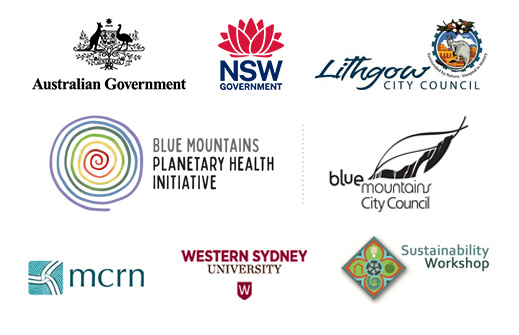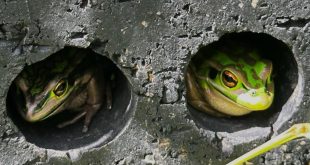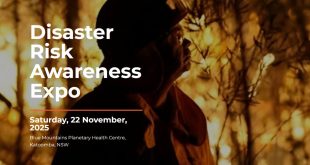
Glenbrook CWA members (L to R) Judy Vandervelden (President), Robyn Scheinflug (Secretary), Elvie Murphy, Gabriele Somers (International Officer) and Vickie Anderson (Treasurer) at their recent stall in Blaxland where they raised money for community and social causes. (Photo courtesy R Scheinflug)
Story by Gabiann Marin
The Country Women’s Association is known for selling scones and crafts at kerbside stalls, but is less known for being one of the largest lobby and environment activist groups in Australia. There are local branches in Glenbrook, Leura and Blackheath.
Key Points:
- The NSW Country Women’s Association is one of the largest and most effective advocacy organisations in Australia, with a history of advocating for, and achieving, positive social and environmental progress.
- The local branch of the CWA in Glenbrook offers women an opportunity to be involved in social good while creating social connections and (if they so desire) indulging in their love of craft and cookery.
- As a truly democratic and women-led organisation, individual branches and their members have a fundamental voice in organisational activities: making it one of the most practical ways women can get involved and have a say in bigger issues.
For over 100 years the CWA of NSW has quietly and effectively worked for change: lobbying governments, presenting ideas and fundraising for causes to assist regional and rural women and girls to have better access to education and healthcare. They’ve also championed and supported environmental protections, community safety, health research, disaster recovery and social justice across Australia.
As the NSW branches geared up for the annual CWA Conference in May, the indefatigable women of the Glenbrook CWA were once again out in the community offering baked goods and handicrafts as they advocated for the community, grew social connection and raised funds for Australian women of all generations.
The small stall, set back against the wall in the Blaxland shopping centre, is bursting with colourful crafts and delicious baked goods. Jams and marmalades are proudly displayed in tartan-lidded jars. Cosy hand-knitted scarves, beanies and jumpers crowd the black garment rack, as those out for their weekend shopping appreciatively admire the handiwork and select a handmade treat to take home to their families.
For many residents of the Mountains, this is the image they have of the Country Women’s Association. A group of friendly, dedicated women who run neighbourhood bake stalls, fetes, markets and agricultural shows to sell their handicrafts and homemade foods.
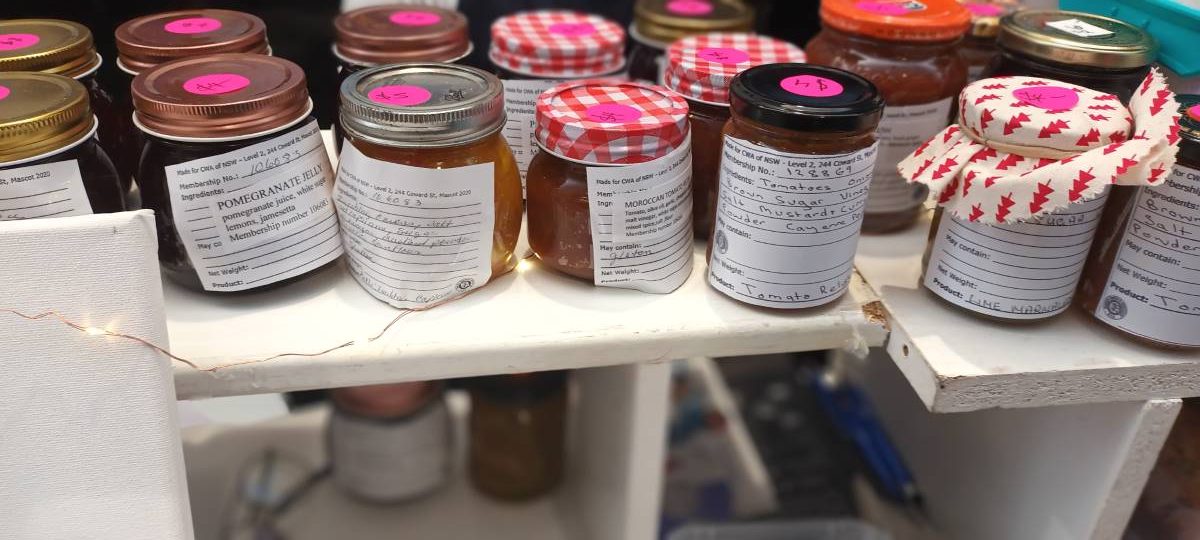
Traditional jams and spreads help fund the CWA’s massive program of activities. (Photo G. Marin)
But if you take the time to chat to any of the CWA volunteers, it suddenly becomes clear that the role of the Country Women’s Association goes far beyond home cooking and needle craft. These women are part of the backbone of social and cultural advocacy across their state, and their tireless efforts extend to more than just long hours of baking.
The Glenbrook Country Women’s Association works to fundraise for a number of causes, Glenbrook Secretary Robyn Scheinflug explains: “We support regional hospitals, provide money for Ovarian Cancer research, support rural firefighting efforts and lots of other important events.”
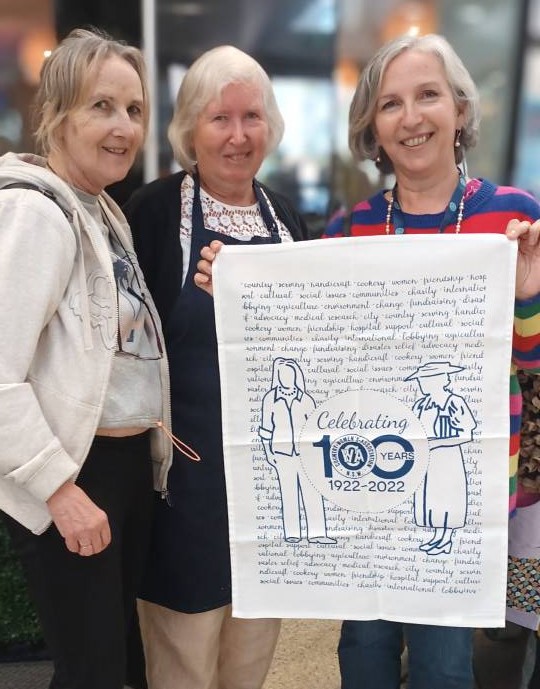
Christa Crewes (member volunteer), Carolyn Watson (Branch Cookery Officer) and Gabriele Somers (International Officer) are proud to be part of the CWA’s long history of advocacy and community action. (Photo G. Marin)
“I always wanted to help women and girls, and the best way to do that is to join the CWA,” Gabriele Somers adds. “I want to give back, so when I retired I joined the Glenbrook branch. I like the social element as well. It’s great to be with so many like-minded women. The community aspect is fantastic.”
Although the Blue Mountains sits in that odd nether-sphere of not quite city and not quite country, the area has a number of vibrant Country Women’s Association branches doing important work across a range of advocacy and fundraising activities.
“You don’t have to live in the country to be part of the CWA,” Robyn explains. “There are branches all over NSW, and other states have their own affiliated organisations as well. We support regional and rural women and their concerns and help out wherever needed. Recently we helped fundraise for Victorian and Queensland women’s associations who were experiencing a number of natural disasters.”
The rise in natural disasters, including floods, landslides and bushfires across Australia, particularly in the rural and regional areas, has been a big focus of the State CWA’s activities over the past few years. Their unique perspective, reflecting the membership of strong independent country, regional and urban mothers, grandmothers, sisters, aunts and daughters helps them see the most pressing larger issues and push for practical and effective change.
Their main purpose is to help improve the lives of women across Australia, particularly in regional and remote areas, and that means considering all threats, including planetary health, financial pressures, homelessness and the impacts of social and environmental challenges for women and girls in crisis.
Climate change and the impacts of mining and fossil fuels has emerged as an important focus of their lobbying and advocacy efforts, with the CWA becoming one of Australia’s most effective and largest environmental advocacy organisations.
The CWA of NSW is currently advocating for the reduction of fossil fuel mining in regional areas. As the representative for the voices of regional and rural communities, supported by branches in semi-rural and city areas, the women in the CWA have first-hand knowledge of the devastation that coal and gas mining can have on agricultural and native bush land.
Led by President Joy Beames, the NSW Country Women’s Association has been vocal in its ongoing opposition to coal and gas exploration and mining in country NSW. Most recently they have been protesting the Santos Gas Project in Narrabri, arguing that this and other projects like it have long term and serious effects on the health of agricultural production, and the local communities who rely on it.
They are also moving to act proactively to protect the Liverpool Plains in North West NSW, where an approval has recently been granted for further CSG exploration just outside of Gunnedah in the Liverpool plains area.
However, unlike many large political organisations, the CWA of NSW isn’t a top-down kind of organisation. The whole ethos of the CWA is designed to listen to, respond and reflect the concerns of the members. Its activities are wholly determined through clear and responsive engagement with branches throughout the state, reflecting the real concerns of the membership more broadly.

Glenbrook volunteers Eva Randall, Pauline Kinder, Robyn Scheinflug (Secretary), Jennie Rothwell, Jennifer Farrar and Elvie Murphy celebrate 70 years of the Glenbrook CWA branch. (Photo courtesy Robyn Scheinflug)
“We have small branches who meet regularly,” Robyn says, “and we look at the activities we wish to do and areas we want to support in the local and state area. Then we can run our own activities or suggest larger advocacy or concern about issues up to the Blue Mountains Group, who then can present this to the NSW leadership. Once a year there is a big state conference where representatives of the whole membership have the opportunity to discuss and set our activities and projects for the next twelve months.”
At the CWA Conference in Coffs Harbour this month, everything from women’s healthcare to the problems of vaping and issues around regional crime rates were brought onto the agenda from different branch members.
For local CWA member Michele Templeton, it’s this aspect of the organisation which really resonates with her. “We have been involved with so many great projects. Did you know it’s thanks to the CWA that we have rumble strips on roads, and seatbelts in cars. We have done so much for community safety.”
Vickie Anderson, who joined the organisation in 2019 is proud of CWA’s historical impact on improving women’s health and wellbeing and is pleased to see it is still a key focus of the organisation’s activities. “At the moment our big focus is on women’s mental health, homelessness and disaster relief,” she says proudly.
Kerry Mitchell, nods in agreement. “We also fund medical student scholarships in rural areas, and of course there is the Royal Easter Show where we get to show off all our crafts and raise awareness of the CWA more generally.”
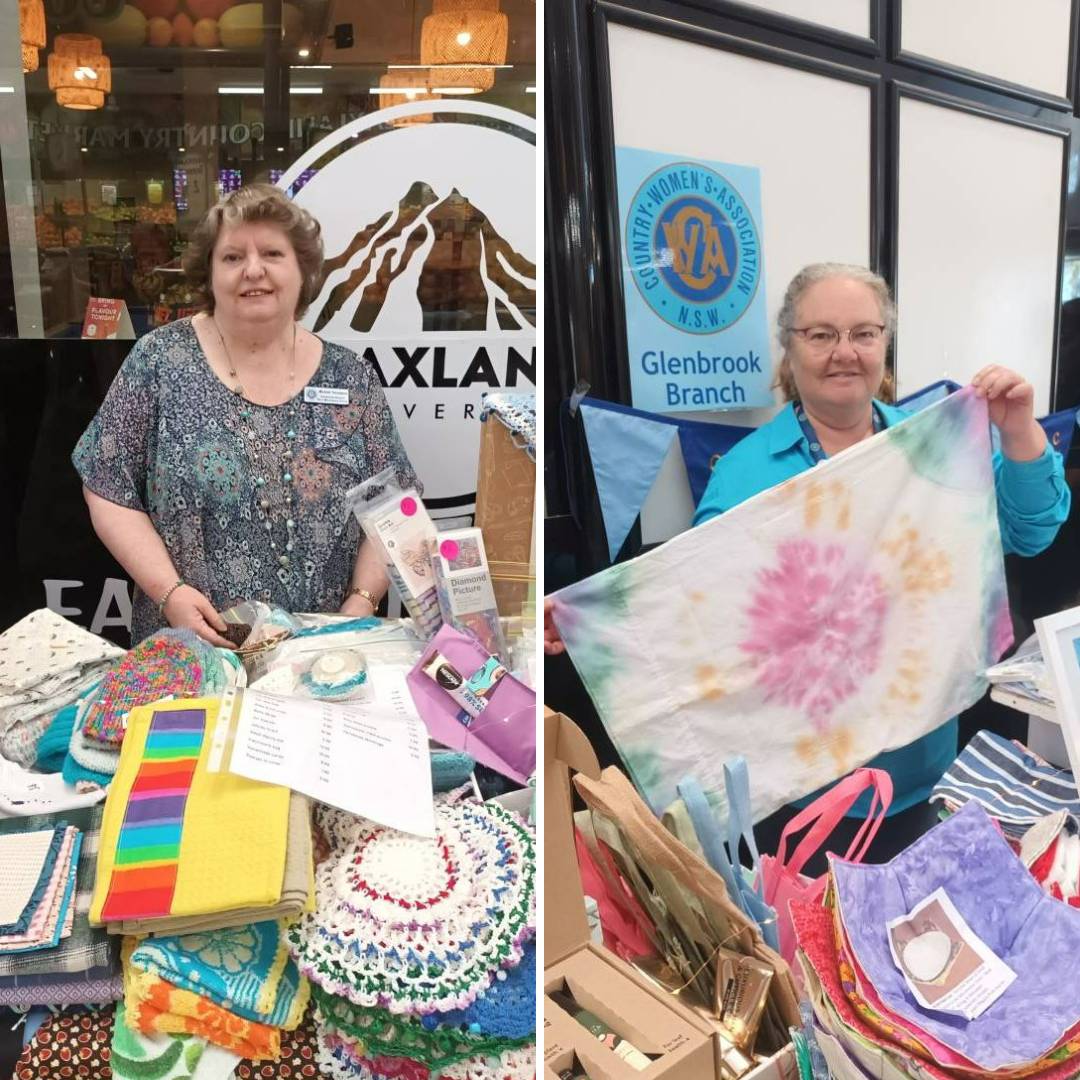
Glenbrook Branch member Michele Templeton (L) is particularly proud of CWA’s efforts in road and community safety, while Kerry Mitchell (R) loves the opportunity to promote handicrafts and fundraise for good causes. (Photo G. Marin)
With the help of volunteer members like Michele, Vicki and Kerry, the CWA has been instrumental in a number of social and environmental changes in Australia over its 100 plus year history and continues to be a force for good in the community.
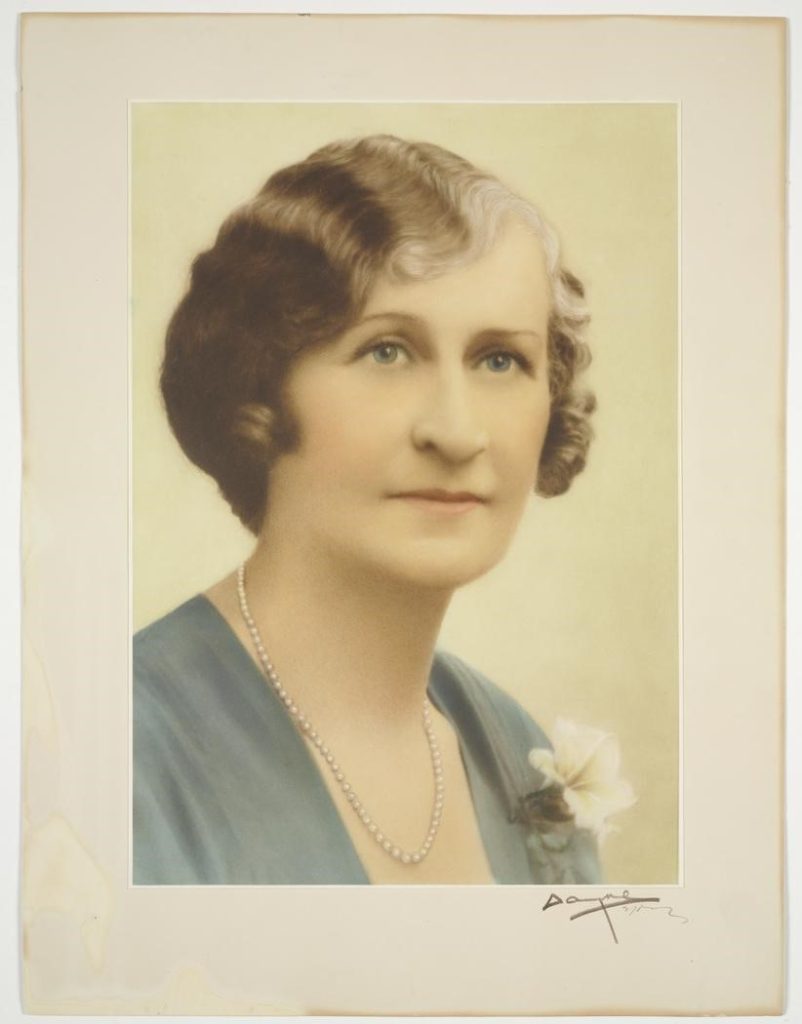
First President, Grace Emily Munro, helped to focus the CWA of NSW on the needs and challenges of rural women in Australia, Photo creative commons NSW Public Library
Originally set up in 1922 as an advocacy group to improve women’s health outcomes and opportunities in regional and rural Australia, the organisation was fundamental in helping to set up rural baby health centres, fund more regional nursing positions and support maternity wards and rest homes.
Even at the genesis of its existence the first President, Grace Emily Munro understood that women’s health and wellbeing needs were far ranging and intergenerational, so helped to ensure the organisation could respond to a variety of needs across the community.
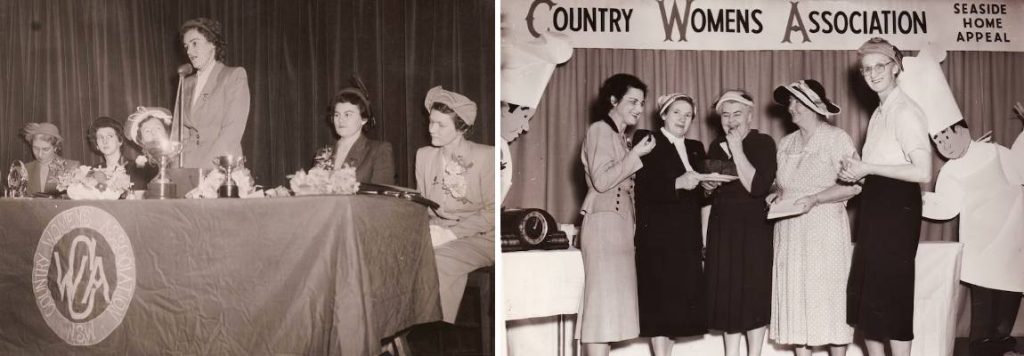
Run by women, for women: the Country Women’s Association has developed across the decades as a force for change in areas of women’s and rural healthcare, environmental protections and education. (Photos creative commons 2.0)
As the CWA grew in success and stature, the organisation evolved into the current interactive branch structure and as a result could engage in other areas of concern for Australian women: including educational support for regional children and young adults, funding research into women’s health conditions, supporting community focused solutions to crime reduction and community safety, and of course, better social justice outcomes for women and children across Australia.
As time moved on the CWA moved with it, its nimble and responsive organisational structure allowing it to refocus its activities into local and state activities, and identify areas of most need for its membership and their concerns.
As they expanded, they engaged more with larger political issues like women’s voting and general rights and protection, recognition for Aboriginal Australians in our constitution, and more recently a focus on environmental and land protection.
Other State organisations connected and assisted each other in times of crisis, and the CWA of NSW also affiliated with the worldwide women’s organisation Associated Country Women of the World, allowing them to extend their activities and campaigns to international support for rural women across the globe, creating a truly international village of connected rural women.
On the agenda currently is fundraising and awareness programs for a number of health concerns such as the rise in ADHD. They are actively lobbying governments to increase accessibility and reduce costs for diagnosis and treatment for adults with Attention Deficit Hyperactivity disorder.
They are also advocating for increased funding for research into treatments and cures for adenomyosis, a little understood, but quite prevalent, uterine condition that causes highly painful symptoms for between 20% – 35% of menstruating females. Older women are also a focus with the NSW CWA. They are fundraising and lobbying governments for better palliative care options in regional service hospitals and the implementation of the NSW Royal Commission’s recommendations for better oral and dental care for older Australians.
While this may seem exhaustive, it’s really only the tip of the iceberg. The CWA of NSW are also supporting regional universities and providing scholarships for country students to access higher education, as well as coordinating statewide efforts to urge the government to address the current housing and homelessness crisis for older women across Australia.
As well as their opposition to CSG mining, the CWA has organised activities and lobbying to help secure koala habitats across NSW; they are actively lobbying governments to undertake more effective weed management and control to protect natural ecosystems; and the CWA has been one of the most effective advocates for state-wide cat curfews, containment and mandatory desexing of domestic cats: something that will have a monumentally positive effect for our natural fauna, devastated by domestic and feral cat populations.
These efforts are starting to have real world effects as the conversations around ethical cat ownership, particularly in the Blue Mountains, is strongly turning to support the CWA’s position on this issue.
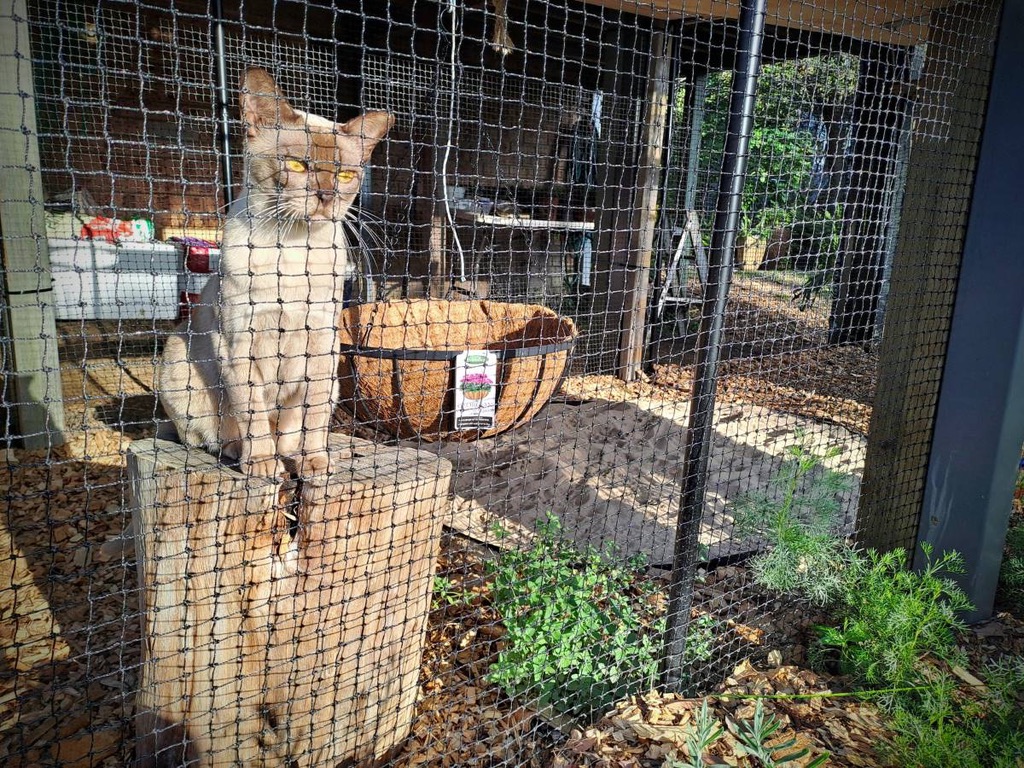
The CWA is currently working to urge State governments to legislate cat curfews, desexing and other restrictions to protect native wildlife. (Photo: Belle Butler)
It is truly amazing what a few scones, some handicrafts and a group of dedicated, inspirational women can achieve.
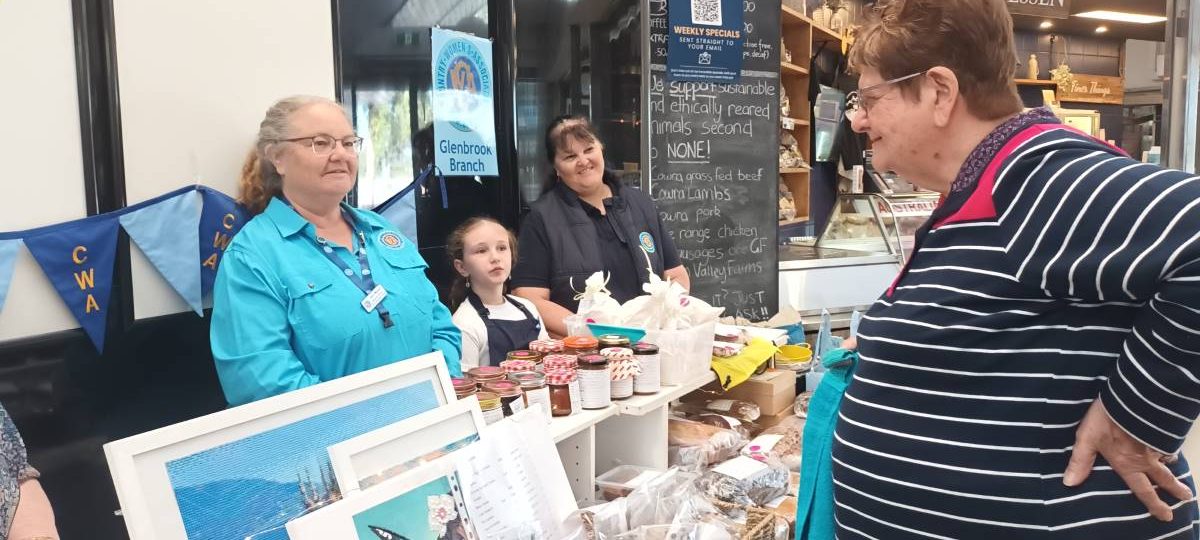
The CWA local bake and handicraft stall gives volunteers the chance to engage with the community and support the larger fundraising efforts of the organisation. (Photo G. Marin)
Continuing the Country Women’s Association hasn’t been without its challenges.
The lives of women have changed. We are more likely to have to work full time, and have less time to do the cooking and baking and handicrafts that form the basis of the organisation’s historical fundraising and awareness efforts, never mind getting involved in the day-to-day activities of the branches.
Populations in regional areas have dropped and urbanisation has spread into previously regional and semi-rural areas. As a result, the needs of the organisation has shifted and the Country Women’s Association has responded by shifting its own branch organisation and structure to cater to the needs of the new generation of Australian women.
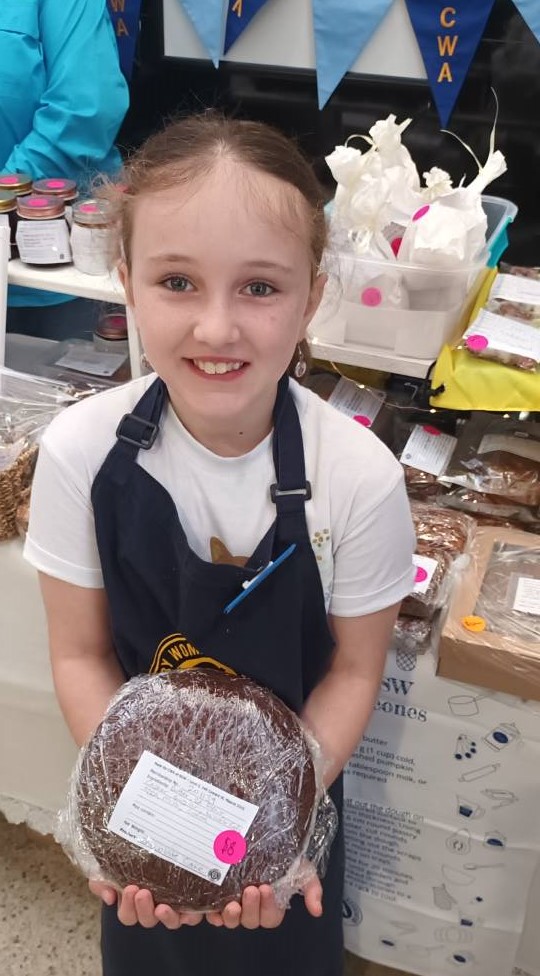
One of the CWA’s youngest volunteers, eight-year-old Izabella Edwards proudly displays her home baked cake – which was available for purchase at the stall. (Photo G. Marin)
As well as founding more city and regional branches like Glenbrook, and expanding the areas of fundraising and advocacy, the organisation looked at the practical needs of new members.
“We now have a number of night branches, which are accessible to women who work during the day. Their focus is less on baking or stalls and more on fundraising,” Robyn explains. “Since a lot of them are business people, they can organise sponsorship for campaigns and the Glenbrook Evening Branch does a lot of care packages for women in crisis.”
Both Glenbrook and Leura offer a night branch option for women in the area.
While the daytime branch in Glenbrook includes more older, retired or non-traditionally employed women, there is still a wide variety of experience within the group. There is also a continuation of intergenerational involvement as grandmothers pass down the CWA’s tradition of social justice and service to granddaughters, aunts to nieces and mothers to daughters.
Eight-year-old Izabella Edwards is a third generation Glenbrook Country Women’s Association volunteer, happily tending the recent Blaxland stall with her grandmother Vickie and Great Aunt Kerry, who themselves are following on from their own mother. A great example of how the Country Women’s Association will be able to move through the times and continue its tradition of advocating for and through a diversity of Australian women, well into the next generation.
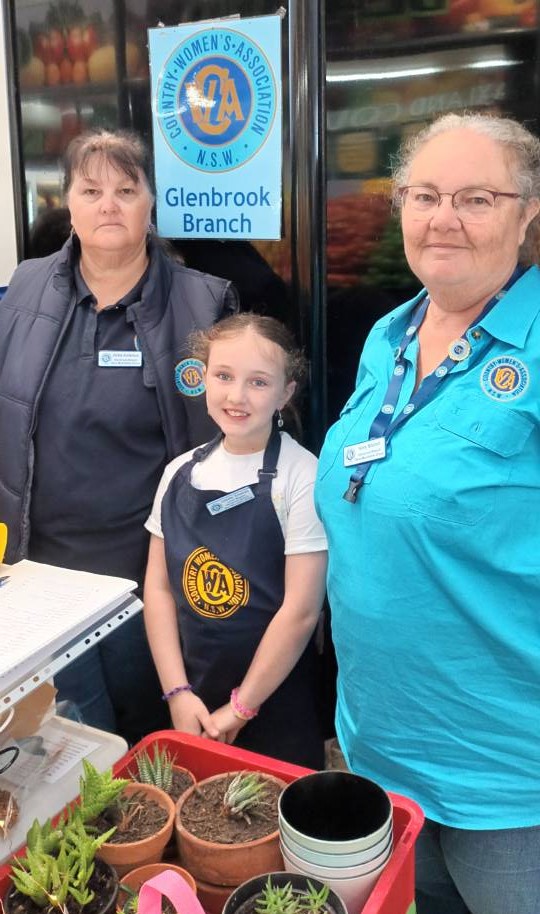
The tradition of CWA advocacy and service continues as Izabella (centre) follows in the footsteps of her grandmother Vickie (left), and great aunt Kerry (right) Photo G. Marin
Get involved:
- Join the Country Women’s Association: membership is open for either the Glenbrook evening or daytime branches. There are also branches in Leura and in Blackheath. Men can also get involved as supportive assistants at the CWA’s many events, although membership is restricted to females.
- Meetings are held:
- Daytime: 2nd Wednesday of the Month at 12.30pm for the Glenbrook Day Branch. Meets at the Early Childhood Centre, Park Street Glenbrook
- For more information contact Branch Secretary Robyn Scheinflug robynatwinmalee@gmail.com
- Evening: 2nd Monday of the Month at 7pm for the Glenbrook Evening Branch who meet at the CWA rooms in Glenbrook.
- For more information about the Evening Branch contact Branch Secretary Jennifer Navin jnavin@bigpond.com
- Donate to the CWA of NSW to help support their fundraising for any or all of the important campaigns they are currently engaged in.
- To donate or simply find out more about NSW CWA’s current activities visit the website
Share this article:
This story has been produced as part of a Bioregional Collaboration for Planetary Health and is supported by the Disaster Risk Reduction Fund (DRRF). The DRRF is jointly funded by the Australian and New South Wales governments.
